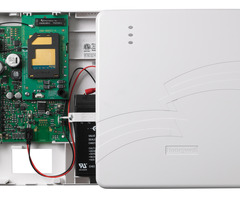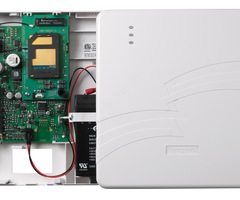Honeywell GSMV4G: Communicator Review
Related Products


Description
The Honeywell GSMV4G is an alarm system communicator with an advanced set of features that are built for reliable performance in 21st-century alarm system applications. In this video, Alarm Grid breaks down how the GSMV4G works, and why it’s such a desirable addition to your home security system.
The GSMV4G uses AT&T’s cellular network to communicate with alarm control. This is known as wireless communications. The GSMV4G wires to your alarm system’s control panel, but then it uses wireless communication to connect with the control center and relay important information about the status of your alarm. Within the GSMV4G is a SIM card, just like you’d find on your cell phone. That SIM card allows communication with system monitoring. Compared to traditional phone line monitoring or internet only communication systems, a cellular communication system is safer and more secure.
Sterling at Alarm Grid explains that the cost of using AT&T’s network is rolled into the cost of your alarm plan, and your alarm company handles billing with AT&T. That way, the homeowner doesn’t have to worry about paying for the cellular service separately and generating a new bill that needs to be paid every month to keep the service connected, or going down to the store to speak with an AT&T representative. The cost of the SIM card and the use of AT&T’s network is just rolled into the bill you’re already paying with the alarm company.
The video further explains that these communicators from Honeywell are a great way to manage your Total Connect 2.0 or central station service. In addition to the GSMV4G, Honeywell also manufactures a similar communication system that relies on the internet instead of a cellular network to communicate. This communication system is slightly more affordable because it taps into your existing internet service plan, instead of requiring a SIM card and cellular service for use.
While it’s cheaper, it’s not as reliable as cellular communications, because there’s always the chance that internet service could be down in your home, which would render communication between your alarm panel and the central station impossible. Honeywell also manages a dual path communicator that brings the best of both worlds from the cellular side as well as the internet side.
If internet service is running, the communicator will use the internet to connect with system monitoring. But, if the internet is unavailable, the cellular network is there to provide backup and ensure that communications are never interrupted.
Sterling explains that Alarm Grid recommends cellular communications with every alarm system, and the reasoning certainly makes sense. If you’re already going to be paying for alarm system service, you expect peace of mind knowing that your system is going to work when you need it most. Without cellular service, you run the risk of your alarm failing to communicate when you need it most. So, while other communicators may be more affordable, they aren’t as reliable as the GSMV4G from Honeywell.
Transcript
So this one is the GSMV4G, and it uses AT&T cellular network. So this is what we call "wireless communications." This, again, wires to your control panel, but then it's got an actual cellular communicator with a SIM card. Your alarm provider pays for the SIM card, so you don't have to worry about going down to AT&T and getting a new data plan. It's often wrapped right into the price of the monitoring service so that all you have to do is get the communicator and sign up for the right service plan.
Typically, the service plan that you get that gives you central station service and/or total connect service-- the same functionality works if it's internet or cellular. But again, the reason you pay a little bit more for a plan that has cellular is because you're paying for that SIM card to be active so that it can send the signal out, even if you've lost the internet in the home. So this is a more reliable and more secure form of communications.
We recommend cellular on every alarm monitoring system that you're going to do. If you're going to pay for service, you want it to work when you need it. When you go with the less expensive internet only, you have to understand the implications of that.
- Uploaded
